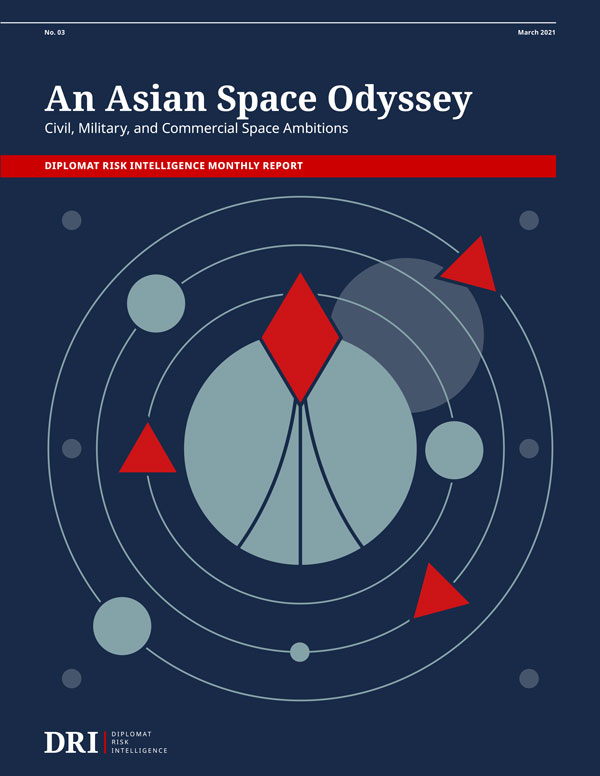| Welcome to the latest issue of Diplomat Brief. This week our top story looks at Japan-U.S. cooperation on “Beyond 5G” technologies, with an eye toward the Biden-Suga summit this week. We also have an interview with Rear Admiral Jean-Mathieu Rey, the joint commander of French armed forces in the Asia-Pacific, on Paris’ Indo-Pacific security approach. |
| Story of the week |  | DIPLOMACY Can Japan and the US Lead the Way to 6G?What Happened: Amid growing security concerns about handing over telecom infrastructure to Chinese firms, Japan and the United States have to face a hard reality: There are no homegrown alternatives to turn to for deploying 5G networks. Both Tokyo and Washington are looking to position themselves as more competitive for the next generation of wireless technology – 6G and beyond. Our Focus: “Even as 5G networks are only just becoming commercially available, U.S. and Japanese policymakers are already considering how they can prime their de facto national champions to be at the cutting edge of ‘6G’ or ‘Beyond 5G’ technologies,” write Jim Schoff and Joshua Levy of the Carnegie Endowment for International Peace. “These are some of the so-called emerging technologies enshrined in a new bilateral policy working group set up in advance of the Biden-Suga summit.” What Comes Next: Technology cooperation will be one of many points on the agenda as Biden and Suga meet for the first time later this week. How the governments take action to bolster private technology firms – whether alone or in concert – will help shape the future of the digital sector. Read this story |
| Behind the News | INTERVIEW Jean-Mathieu ReyRear Admiral Jean-Mathieu Rey, the joint commander of French armed forces in the Asia-Pacific, on France’s role in the Pacific: “In a strategic context focused on the growing competition between the U.S. and China, France could be a credible alternative for many countries in Southeast Asia.” Read the interview |
| This Week in Asia | Northeast Asia Japan’s Nuclear Wastewater Dump Sparks OutrageThis week, Japan confirmed a controversial plan to release radioactive wastewater from the Fukushima Daiichi Nuclear Power Plant into the Pacific. With storage space for the water nearly at capacity, the government says it has no choice. The plan, however, has sparked protests from local fishing communities worried about marine pollution as well as outrage from neighboring China and South Korea. The decision will continue to resonate politically and diplomatically long after the water is released. Find out more | South Asia US Conducts FONOP in Indian EEZ, Annoying Officials in New DelhiOn April 7, the US navy destroyer John Paul Jones conducted a freedom of navigation operation (FONOP) about 130 nautical miles west of India's Lakshadweep Islands. While the United States has, in the past, routinely carried out FONOPs in Indian exclusive economic zones as well as territorial seas, the forthright -- and to some Indian ears, blunt -- language of the US 7th Fleet statement announcing the operation has raised eyebrows in New Delhi, especially as India and the United States continue to be deeply invested in the bilateral defense relationship. Find out more | Southeast Asia COVID-19 Flares Up in Thailand and CambodiaAside from the continuing political crisis in Myanmar, this week’s story to watch is the runaway spread of COVID-19 in Thailand and Cambodia, two nations that weathered the first year of the pandemic with relative success. In addition to prolonging the countries’ economic recovery, the current outbreaks stand as a reminder that even as wealthy nations achieve widespread vaccination coverage, the crisis for some poorer nations could drag on for years. Find out more | Central Asia Afghan Peace Talks Get a JoltThe United States floated April 16 for the start of a 10-day conference on Afghan peace in Turkey, but the Taliban say they aren't ready to attend. That headline was quickly buried by a Washington Post report that Biden is soon to announce a new withdrawal deadline: September 11, 2021. Find out more |
| Visualizing APAC |  | Portraits of victims of the Khmer Rouge on display at the Tuol Sleng Genocide Museum in Phnom Penh, Cambodia. A photography project colorizing – and altering – the photos has sparked outrage in Cambodia. See the full picture |
|  |





